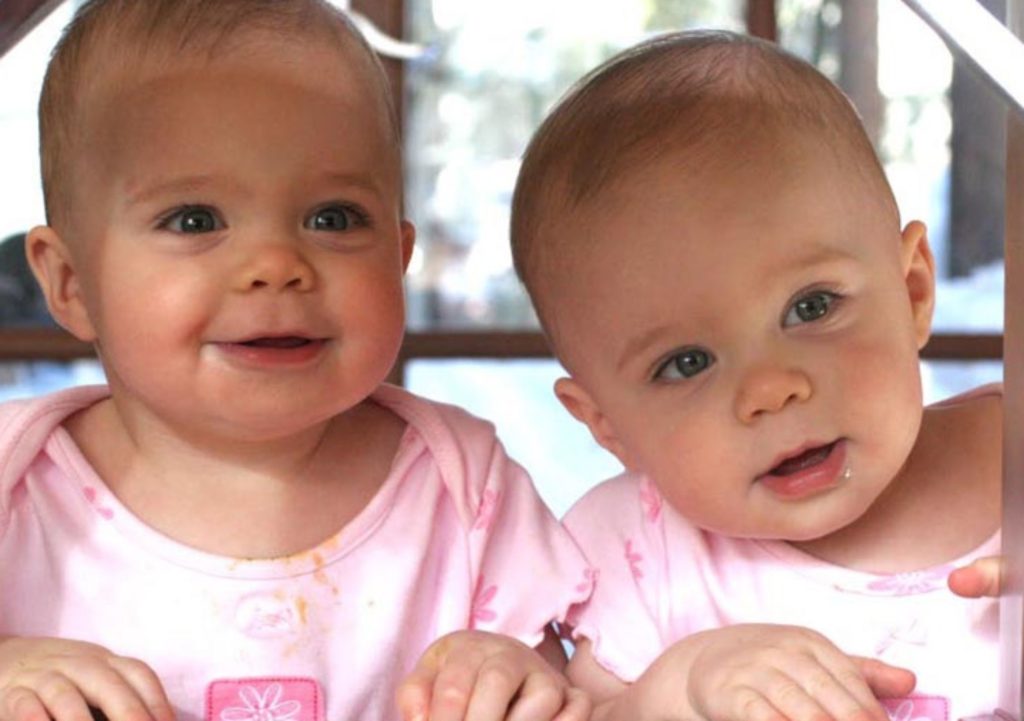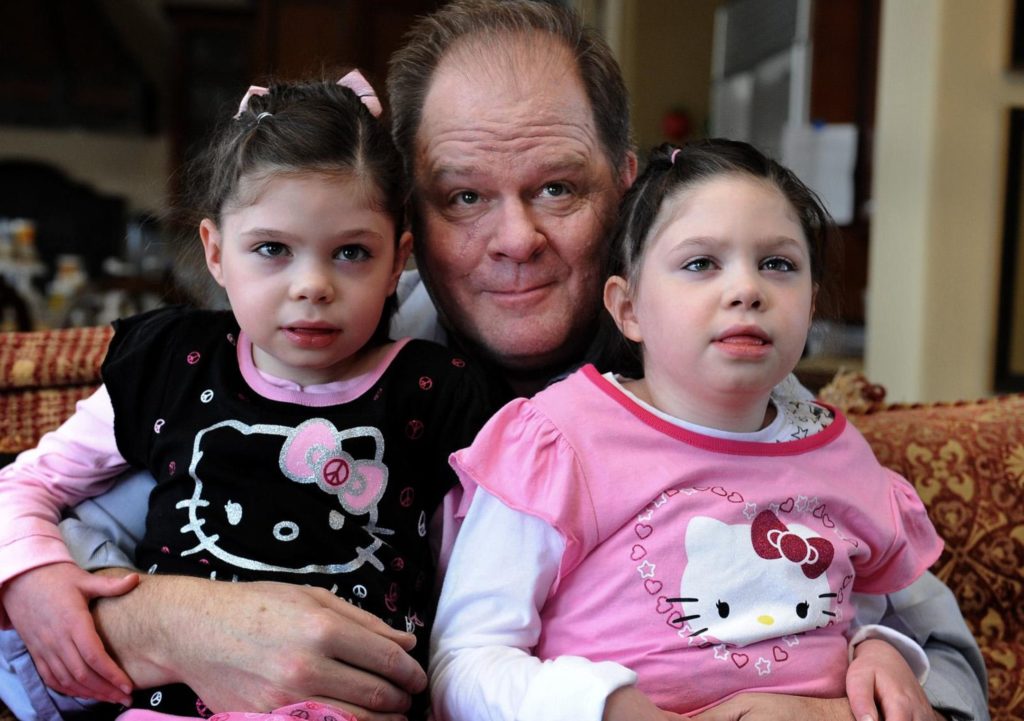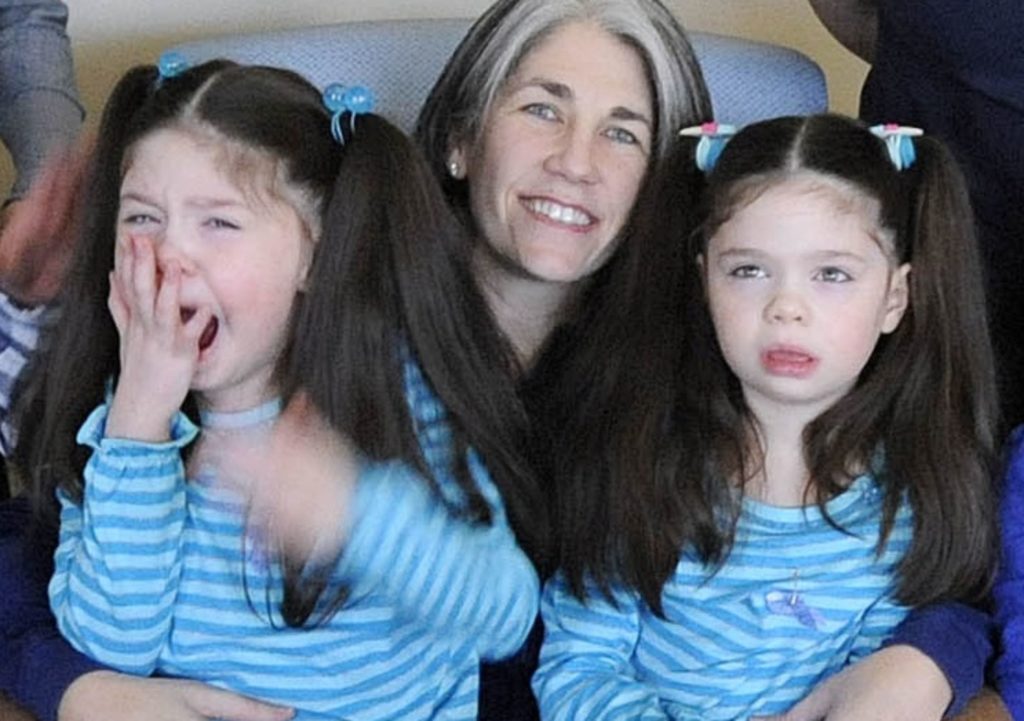PARENTS CHRIS AND HUGH HEMPEL DID THE NEARLY IMPOSSIBLE IN A FRANTIC SEARCH TO SAVE THEIR DYING DAUGHTERS
A Reno couple who have spent the past 10 years trying to save their daughters’ lives are now battling biotech and pharmaceutical companies that they claim stole a lifesaving treatment they pioneered that could be worth hundreds of millions of dollars.
Filed in U.S. District Court in Reno, Chris and Hugh Hempel and their twins Addison and Cassidy, 13, are suing for “no less than” $100 million for what the suit says is the misappropriation of confidential information and a plan to market a treatment for Neimann-Pick Disease Type C.
In the lawsuit filed Jan. 5, the Hempels claim they were swindled out of a plan they had to develop a treatment that has kept their girls alive. The lawsuits says big pharmaceutical companies have used their plans and their daughter’s medical records to broker multimillion-dollar deals.

Twins Addi, left, and Cassi Hempel wait in their Renown Regional Medical Center hospital beds in 2009 for infusion pumps to be attached to ports (Photo: RGJ file)
Addi and Cassi Hempel were diagnosed with Niemann-Pick Type C when they were 3. The rare and fatal genetic disease is often referred to as childhood Alzheimer’s disease. It causes cholesterol to build up and be trapped in cells, overloading organs and attacking the brain. Most children don’t live past their teens.
But after receiving the devastating news this would kill their girls, the Hempels went to work, achieving something unheard of in the medical community, according to Dr. Caroline Hastings of the UCSF Benioff Children’s Hospital in Oakland. She has treated the girls.
The Hempels found researchers who were about to publish a study on the effects cyclodextrin, a simple sugar compound, has on mice with Niemann-Pick Type C.
They formed a team, with Hastings, and successfully lobbied the Food and Drug Administration for approval to treat their daughters using that compound.
Many called them crazy to try something untested, untried and unstudied on humans.
“I had other doctors say they wouldn’t have agreed to do what we did,” Hastings said.
“I remember early on someone asked me, ‘What is the worst that can happen from trying this?’” Hastings said.
“They could die from this treatment,” she said.
“But Chris and Hugh knew that and acknowledged that, knowing it might save others.”

Today, the girls continue to suffer from seizures and periods of dementia. Just a week shy of their 14th birthdays, they have lost their ability to walk and talk but still recognize and communicate with their parents through verbal sounds, touching and kisses.
They require constant, 24 hours a day, seven days a week care at home.
Chris and Hugh Hempel and their attorneys would not comment on the lawsuit, but the 25-page court document reads like a David vs. Goliath story.
In August, Chris Hempel wrote on Facebook, “A massive fraud has been perpetrated not only against the twins and our family but our researchers, doctors, hospitals, donors and community. Cyclodextrin has been stolen and now sold for $200 million dollars!! It’s going to a billion++ dollars when approved. This was a drug funded and created by all of you who helped us.”
Named in the suit filed by two New York attorneys and David O’Mara of Reno are three companies.
- Cydan, funded by big-name pharmaceutical companies including Pfizer, one of the largest pharmaceutical companies in the world. Its website says it was the first orphan drug accelerator, named for the Orphan Drug Act of 1983. The act is meant to encourage the development of medicines for rare diseases. It grants seven years of exclusivity for drugs that treat a specific condition that affects fewer than 200,000 people, making a drug that previously pharmaceutical companies have not allocated time and resources for because of the possible limited financial gain. According to the suit, Cydan first approached the Hempels about a partnership to develop cyclodextrin in 2013.
- Soon after reaching out to the Hempels and agreeing to a joint venture, Cydan formed Vtesse, a company dedicated to developing drugs for Niemann-Pick Disease Type C and other rare diseases. In April 2017, Vtesse was purchased by Sucampo Pharmaceuticals for $200 million, in large part because of the same treatment, the suit says, the Hempels were in contract to develop.
- In December 2017, Sucampo was purchased by Mallinckrodt, a global pharmaceutical company, for $1.2 billion. The press release highlighting the acquisition mentions the development on the cyclodextrin being part of the billion-dollar deal.

The Hempel twins were born in 2004.
(Photo: Provided to the RGJ)
“Cydan, Vitesse, and Sucampo swooped in to misappropriate the Hempels’ confidential information and trade secrets, developed a directly competitive treatment, and sold it to an international pharmaceutical company for hundreds of millions of dollars,” the lawsuit said.
“Cydan’s, Vtesse’s, and Sucampo’s misconduct robbed the Neimann Pick Type C community of its power to fund and control future developments in NPC treatments, and their ill-gotten gains must be disgorged.”
Cydan has not returned calls and emails for a comment.
In a statement, Sucampo said, “While we cannot comment on active litigation, we will defend our position vigorously. We are pleased that Sucampo has been able to play an active role in advancing the science around this potential treatment for Niemann-Pick Disease Type C with the scientific rigor that a clinical trial demands – all in efforts to benefit the patients and families living with this devastating, fatal disease for which there is not approved therapy in the U.S.”

When Addi and Cassi were born on Jan. 23, 2004, Chris and Hugh Hempel were overjoyed.
She dreamed of being a soccer mom, and as the babies grew so did their energy. The couple took hundreds of photos documenting their seemingly perfect life.
The couple has recordings of the girls singing “Twinkle Twinkle Little Star.”
But the active toddlers stopped meeting milestones. They started stumbling and tripping.
They stopped singing.
After two infections and doctors noting the girls had enlarged livers and spleens, they were diagnosed with the fatal and rare genetic disease in 2007.
The Hempels were told their daughters wouldn’t live to be 10.
But the couple, both former Silicon Valley dot-commers who made money cashing out as some of the first employees of Netscape, frantically started looking for treatments.
Answers were hard to find for a disease that affects after approximately 500 people.
The family held fundraisers in Reno and have become activists in the pediatric rare disease community, vowing to do all they could in a frantic search to save their daughters’ lives.
When they read about research at the University of Texas, where a doctor was seeing positive outcomes treating mice with Niemann-Pick Type C with sugar-like compound, cyclodextrin, they ordered some from a distributor and gave it to the girls mixed with water.
Then they did what many in the medical community deemed impossible: They lobbied the Food and Drug Administration, with the help of Hastings, to try the drug intravenously.

Twins Addi and Cassi Hempel, then 7, were diagnosed Neimann-Pick Type C disease.
(Photo: RGJ file)
While they waited for required FDA approval, they shared their data with a family in India, who started treating their son with the compound intravenously. He is believed to be the first human to receive the drug via IV.
Hastings remembers the Hempels writing to the FDA to acknowledge this could kill their girls. But Hastings said the Hempels wrote in their letter that they were doing this in hopes to save their girls and maybe others after them.
The girls received their first intravenous dose of the compound in April 2009.
Hastings, who diagnosed the girls and is considered one of the country’s leading pediatric oncologists, became part of the team to figure out how much to give and how to give it.
“We developed a formation of this drug, constantly testing what we were doing,” Hastings said. “We were trying things over two years.”
When tests showed the drug didn’t cross over from the bloodstream to the brain, the family and Hastings filed a second application with the FDA to administer the compound directly through a port in the brain and then through spinal injections. The girls were the first to have the drug administered this way, Hastings said.
Again, they were seen as breaking down a barrier not crossed by parents, Hastings said.
The suit said the Hempels and their team of doctors, scientists and advisers developed and published the first human cyclodextrin treatment protocols for intravenous and intrathecal cyclodextrin therapy.
People started paying attention.
Hasting said interest in developing the drug would have taken years if it weren’t for the Hempel family.

The drug was improving the quality of life for their girls, and they saw changes. Doctors noted that the effects of the disease seemed to have slowed and they had regained some hearing loss.
The Hempels were receiving national attention for their fight.
Chris Hempel was asked to speak to lawmakers by the National Health Council. She was invited to Rare Disease Day at the National Institutes of Health.
The family was featured in a documentary about their battle to fight medical system and how hard it is for those with rare diseases to get treatment.
They were featured in a profile by a Pulizer Prize-winning writer for the Wall Street Journal who followed the family’s battle for six years. They were profiled in a segment on CNN’s Vital Signs.
“There are giant pharmaceutical companies with thousands of employees who spend billions of dollars to try to crack genetic codes and develop treatments for diseases,” said neurosurgeon and CNN reporter Sanjay Gupta in a segment on the Hempel family. “The couple you are about to meet did it virtually on their own.”
In a 2012 interview with the RGJ, after getting FDA approval, Chris Hempel said it was hard to get pharmaceutical companies to take an interest in developing treatments for rare diseases because they don’t have the same payout as drugs developed for the masses.
“You would think it would be something simple because you are in the sprint to save your childrens’ lives, but the system is screwed up,” she said.
“We are saying there is something that might work to save their lives, and we are being told we can’t use it.”
Soon after, the National Institutes of Health announced it was going to do its own trial of cyclodextrin.
The Hempels were eager to share their data and were overjoyed that the medical community was taking notice of a treatment they had been using for three years.

With the success of the cylcodextrin injections, Chris and Hugh developed Solutions Therapies in 2011. The goal was to get FDA approval for the treatments that had helped their children.
With FDA approval of a rare treatment could also come a priority review voucher, a new program that is considered the golden ticket in the pharmaceutical world.
A company that develops treatment for a rare pediatric condition can receive a voucher that expedites the review process for any other drug. This gives a pharmaceutical company a financial incentive to develop a drug that may only help a few — like Addi and Cassi — for the promise of fast-tracking a different drug that appeals to the masses and has the potential for big profits.
The suit said the Hempels planned to sell the voucher, if awarded, to fund more research for Neimann-Pick Type C and to use the money to keep the cost of treatments low for those with the disease.
The family hired researchers, compiled a library of medical data on their daughters and started filing for FDA approval, using much of their own money.
According to the suit, the Hempels were approached by Cydan, a venture capital-backed drug development incubator on June 28, 2013.
The suit said the firm wanted to commercialize cyclodextrin based on the Hempels’ research.
The suit says the opportunity to develop cyclodextrin was a win for Cydan because of the priority review voucher. Similar vouchers have sold for as much as $350 million.
In 2013, the Hempels and Cydan entered into an agreement to use confidential information including medical records. The Hempels gave the company access to all of their daughters’ medical records and made introductions to the team of doctors they had worked with to develop the treatment, according to the suit.

A recent photo of Addi and Cassi Hempel (Photo: Provided to the RGJ)
The suit says the plan was to split the proceeds between investors and nonprofit efforts to fund additional treatments. Conversations were had about how this drug could have additional benefits to patients with other conditions including HIV and atherosclerosis.
The suit says that in the spring of 2014, Cydan suddenly stopped communicating with the family while it was forming Vtesse, a company whose purpose was to develop cyclodextrin.
In January 2015, the National Institutes of Health announced it entered into an agreement with biotech company Vtesse to develop treatments for Niemann-Pick type C using cyclodextrin.
The National Institutes of Health said it cannot comment on pending litigation or if it has made money on its partnership with Vtesse.
In 2016, the FDA granted Vtesse a priority review status for Vtesse’s cyclodextrin drug, VTS-270.
The suit alleges Vtesse would not have been given this status without the Hempels’ medical records and business and research data.
In April 2017, Vtesse was acquired by Sucampo Pharmaceuticals for $200 million.
The Sucampo press release about the sale focuses on the development of Vtesse’s cyclodestrin drug, VTS-270.
Last month, Sucampo was purchased by Mallinckrodt, a global pharmaceutical company, for $1.2 billion.
Again, the same drug the Hempels say is being developed because of their research and trials on their daughters was a highlight in a press release announcing the deal.
“Mallinckrodt’s acquisition of Sucampo is the latest milestone towards our vision of becoming an innovation-driven specialty pharmaceutical growth company focused on improving outcomes for patients with severe and critical conditions,” said Mark Trudeau, chief executive officer and president of Mallinckrodt.
The release said that its newly acquired cyclodestrin drug, VTS-270, bolstered the value of the company.
The release also said that upon completion of the drug trial and approval for VTS-270 by the FDA, the company would receive a priority review voucher to use or sell.
According to press documents, cyclodextrin could become available from the pharmaceutical company as early as this year.
Hastings said the Hempels have tried for the last few years to work with the companies to rectify the wrongdoing.
It is unknown what the drug would cost to treat patients like Addi and Cassi when it is approved to be sold exclusively by a major pharmaceutical company.
“Was it greed, ego?” Hastings said. “I just don’t know.”

